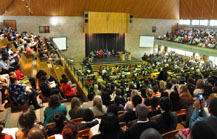 |
|
A jam packed audience listens to the keynote address at the UFS Golden Key Annual new members’ ceremony.
Photo: Stephen Collett
29 August 2012
|
Recognising academic excellence at the University of the Free State (UFS), the world’s biggest academic honour society, Golden Key International Honour Society, selected a record number of Kovsie students as new members this year.
More than 700 top achievers have been invited to join the prestige academic society – the biggest crop of students thus far.
New members, the top 15% of academic students at Kovsies, were welcomed to the society’s UFS Chapter at an induction ceremony held on Saturday 25 August 2012. The ceremony also saw Justice Ian van der Merwe, Chairperson of the UFS Council, Mr Billyboy Ramahlele, Director Community Engagement, and Prof. Hendrik Swart, Senior Professor in Physics at the UFS being recognised as honorary members of the society. The event, held at the Kovsie Church, drew a large crowd with the venue packed to capacity.
Sibusiso Tshabalala, a third-year BCom Law student, and recently selected as one of ten Google Young Minds for 2012, delivered the keynote address. Structuring his talk around dreams, fears and music, Sibusiso told students they had joined a global community of students who valued academic achievement, leadership and service. “In a country where rhetoric triumphs over logic and mediocrity rules supreme, while excellence is fast becoming taboo, we need the thinkers to do the leading.”
Dr Derek Swemmer, Registrar and co-advisor of the UFS Chapter, told the students they had demonstrated the ability and now had to fulfil their potential. He was appointed as Chairperson of the society’s governing body in March this year.